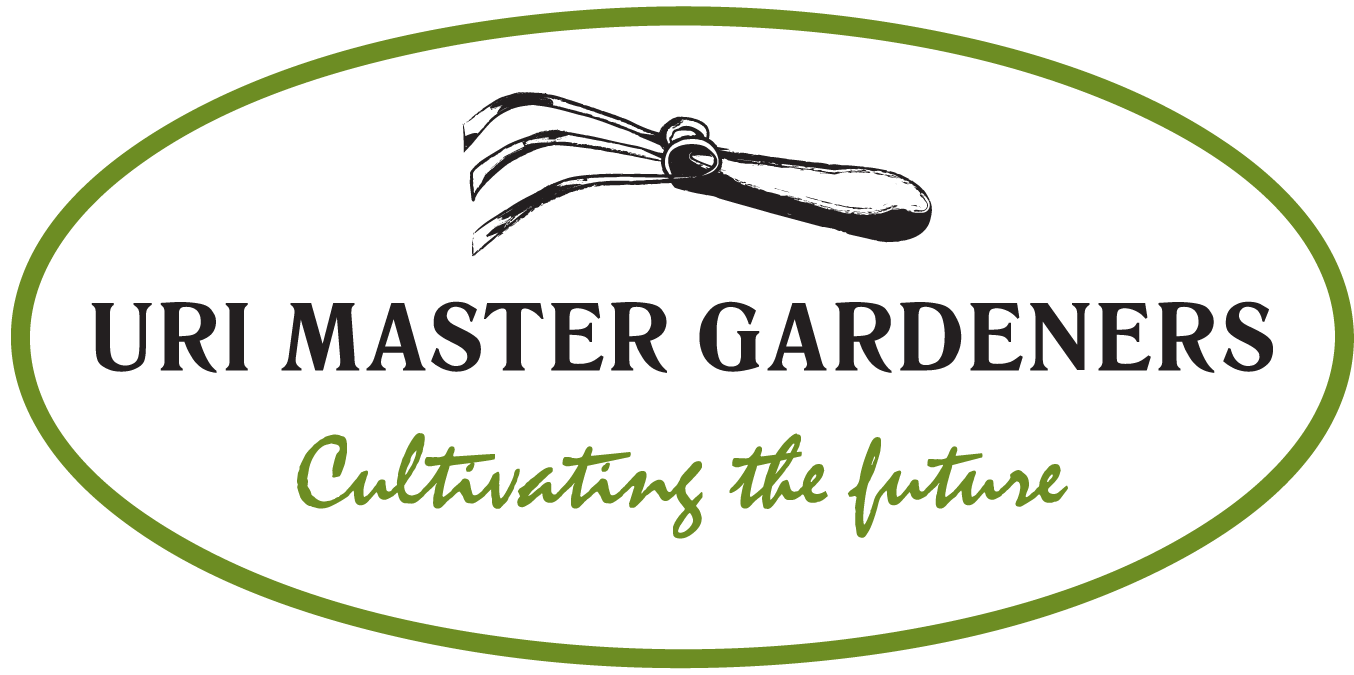URI MGP Newsletter, July 13: An Update from Portland and Summer Education
Update from the International Extension MG Conference
The good work of our Rhode Island Master Gardeners was front and center at this week’s International Extension Master Gardener (EMG) Conference in Portland, Oregon. This event is a great opportunity to collaborate with our peers in the Cooperative Extension system. We have been sharing ideas with other MGs and Coordinators around the country and world, and gaining cutting-edge horticultural knowledge through workshops. The conference is held every other year.
On Tuesday, on behalf of the URIMG School Garden Mentors, we accepted the 1st place in the youth category of the Search for Excellence prize. A 4-minute video showcased the impact of SGMs in improving success of school gardens and connecting youth to the process of growing food and learning from an outdoor classroom. This video generated quite a buzz among conference participants, many of whom also work in school settings.
After a few more edits we will be excited to feature this video in an upcoming newsletter. Congratulations to the School Garden Mentors amongst us!
In addition, Vanessa Venturini, our State Program Leader and the Northeast Representative on the National EMG Committee, was featured on a panel discussion about volunteer retention and motivations. This was based on the data collected from a University of Georgia survey that 90 URIMG’s answered late last year. The Northeast MGs in attendance were eager to continue to collaborate.
In addition to learning about birds in the suburbs, growing in a greenhouse, making your garden more attractive to beneficials, growing everything from fruit trees to clematis, and designing your garden with Thomas Rainer, co-author with Claudia West of the book Planting in a Post Wild World, there has been time to visit beautiful gardens and nurseries in the Portland area. We’ve seen how hops and olives are grown and processed, beautiful shade gardens, nurseries that specialize in odd and unusual plants and looked at Portland’s urban garden movement.
And then there are all the great gardeners we’ve talked to who hail from around the USA, Canada and South Korea.
The good news is, the next two International Master Gardener Conferences are in the East. So mark your calendars. The 2019 conference will be June 18-21 in Valley Forge, PA and the 2021 conference will be in the fall of 2021 in Coastal Virginia.
Help us Choose A Newsletter Name
Hello, everyone…please take a moment to check out the new on-line survey (click here) designed to choose a name for our newsletter. Instructions are on the survey and it shouldn’t take but a minute of your time. Just be sure to submit your choices within the next 2 weeks as we would like to announce the “winner” by the end of the month. Please respond by July 21.
Happy Gardening,
Judy Arruda, Volunteer Engagement Coordinator

Smithsonian Community of Gardens
The Smithsonian Institution is asking for your stories about gardens, greenspaces, and gardening history. Community of Gardens (communityofgardens.si.edu) is the Smithsonian’s digital home for preserving stories of gardens and the gardeners who make them grow. Stories can be anecdotes or interviews, about the past or present, about a particular plant, about a particularly memorable moment spent in a garden or greenspace, about garden traditions or practices, and so much more!
By contributing images, videos, and stories to this website, your participation will help others to better understand the meaning and value of gardens to American life – today and in the future. Share your garden and gardening stories at https://communityofgardens.si.edu/contribution. Email us at communityofgardens@si.edu.

Tallamy in Middletown: Native Plants and Pollinators
 Chaves’ Gardens will be holding a free guest lecture on Saturday, July 15 at 10:00 am by well known author and professor, Douglas W. Tallamy.
Chaves’ Gardens will be holding a free guest lecture on Saturday, July 15 at 10:00 am by well known author and professor, Douglas W. Tallamy.
As the population of pollinators continues to decline, our goal is to help raise awareness of the importance of pollinators and the use of native plants in our ecosystem. Doug will help us understand how just a few native plants can increase wildlife including pollinators.
Doug Tallamy’s book Bringing Nature Home (Timber Press 2007) is an excellent source of information that is easy for home gardeners to use. He is a regular columnist for “Garden Design Magazine” and recipient of many awards including the Silver Medal of Garden Writers’ Assn. No reservations required and no charge, courtesy of Chaves Gardens for their 40th anniversary. This class counts for URIMGP continuing education credit.
American Community Gardening Association 38th Annual Conference
July 27-30, 2017
Capital Community College
Hartford, CT
WORKSHOPS, TOURS (CT & MA), FILMS, GALA EVENT
www.communitygarden.org/conference
877-ASK-ACGA
Time to Nominate for MG and Rookie of the Year Awards
As you may be aware, each year we nominate those Master Gardeners and Interns whom we feel have done an exceptional job. It is now time to do just that. If you know someone who goes above and beyond for the Master Gardeners please send in their names and descriptions of their performance.
The guidelines for these nominations are also found with the forms in the documents page of the website. Click on the links below to access to forms directly.
Click here for Rookie of the Year form. Click here for Master Gardener of the Year Form.
All nominations are due by August 1st so that the Recognition Committee has time to vote on the nominees. Winners (and nominees) will be announced at the September 16th Volunteer Recognition Event. In addition, this year we will also be announcing a Project of the Year award winner to be selected by the Recognition Committee.
Thanks in advance for your help! – Charlie Junod, Chair, Recognition Committee
Farm to Table: Cooking with Native and Locally Sourced Produce
Wednesday, July 19, 2017, 2:00PM
Beechwood Center; 44 Beach Street; North Kingstown
Executive Chef Branden Read is the co-owner, with Cheryl Zannella, of the Celestial Cafe in Exeter, RI, a local family-owned restaurant specializing in the use of locally sourced food from various local farms and fisheries. Branden will be discussing the various locally sourced produce he utilizes and the benefits of employing these items, including native Herbs and Veggies in his cooking.
If interested in attending, please contact Rayna Wilcox, Volunteer/Program Coordinator, at The Beechwood Center for Life Enrichment at 401-268-1594; or email her at: RWilcox@northkingstown.org. These programs are offered to members and the public at no charge. Master Gardeners receive education credits for attending.
We are also excited to announce the rest of our upcoming 2017 Lecture Series! We have a great group of speakers who we are sure will prove to be dynamic and educational. The talks are held every other month and we hope to see you all there! The following is an outline of our speakers and topics for 2017:
- 9/20/17 Creating Pollinator Habitat, Vanessa Venturini, State Program Leader, URI Master Gardener Program
- 11/15/17 Designing the Ecological Landscape, Kevin M. Alverson Landscape Architecture
Continuing Education Offerings This Summer
July Continuing Education Classes
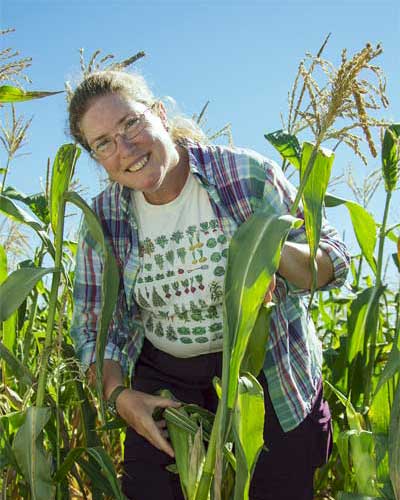 URI Agronomy Farm Tour: Cover Crops, Vegetable, Season Extension
URI Agronomy Farm Tour: Cover Crops, Vegetable, Season Extension
July 19th, 10-11:30 am
Agronomy Farm, URI Kingston campus
Dr. Rebecca Brown, URI Plant Sciences
Join Professor Rebecca Brown for a tour of the URI Agronomy Farm. The URI Department of Plant Sciences and Entomology manages over 50 acres of turfgrass, horticulture, and agronomy farms for teaching, research, and outreach. Attendees would be able to see various cover cropping strategies, vegetable production and season extension techniques.
Please register in Volgistics.
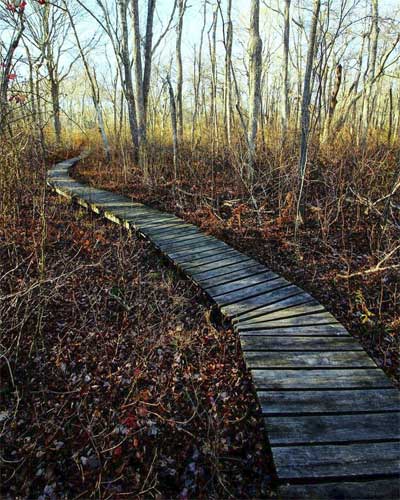 Habitat Restoration Walk at Norman Bird Sanctuary
Habitat Restoration Walk at Norman Bird Sanctuary
Norman Bird Sanctuary, Middletown
July 20th, 3-5 pm
Hope Leeson, RI Natural History Survey
Learn about how to increase habitat resiliency on a landscape level with RI’s premier botanist. Coastal forests provide habitat for migratory nesting birds; a critical function which is at risk due to changes in the plant community. In this walk you learn how removing invasive species from the forest and replanting with diverse local ecotypes of native species play an important role for wildlife. We’ll also gain a greater understanding of the influence white-tailed deer exert on forest regeneration at the Sanctuary.
Please register in Volgistics.
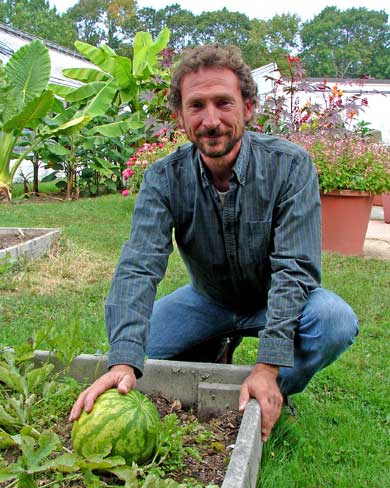 URI Agronomy Farm Tour: Vegetable Research, Soil, Pest Mgt
URI Agronomy Farm Tour: Vegetable Research, Soil, Pest Mgt
July 26th, 5-6:30 pm
Agronomy Farm, URI Kingston Campus
Andy Radin, URI Cooperative Extension
Join URI Agricultural Extension Agent Andy Radin for a tour of the URI Agronomy Farm. The URI Department of Plant Sciences and Entomology manages this Agricultural Experiment Station Farm for teaching, research, and outreach. Attendees will learn about several vegetable crops research projects in progress, and there will be open discussion about soil health, pest management and other topics of interest.
Please register in Volgistics.
August Continuing Education Classes
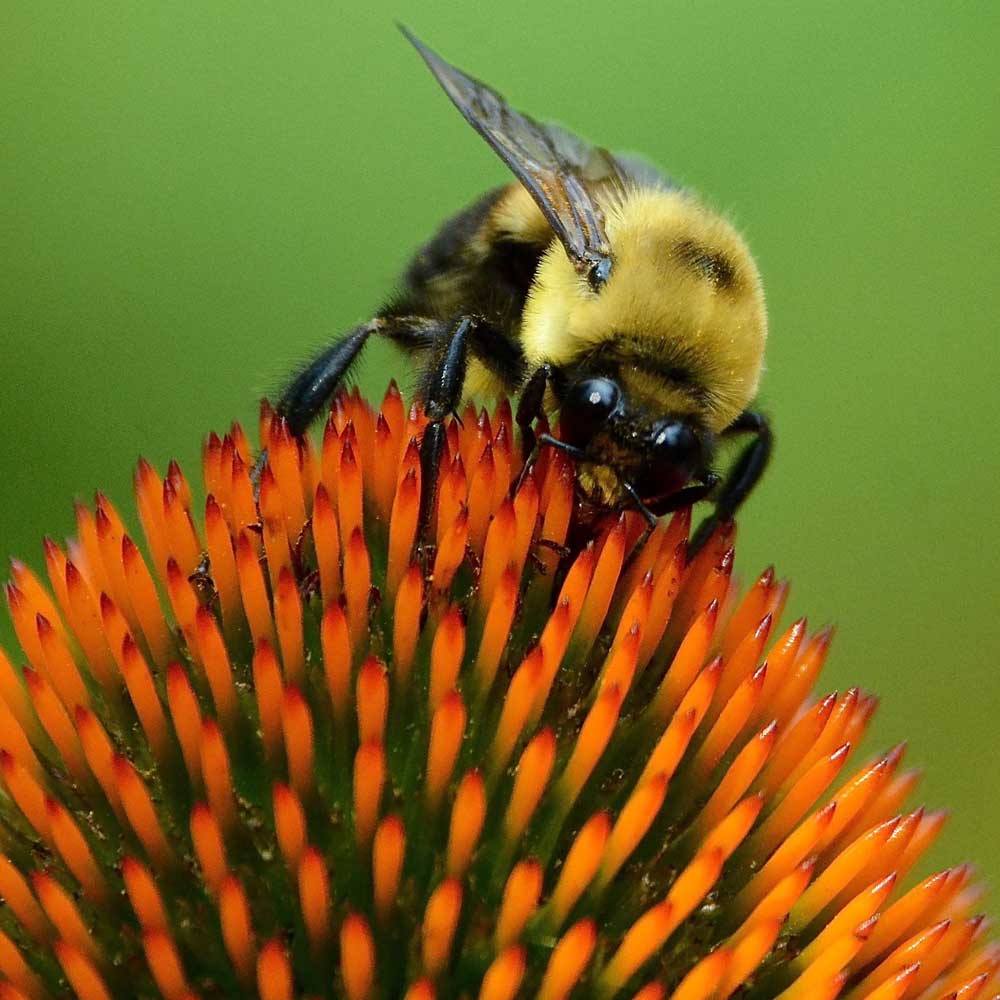 Pollinator Meadow Walk
Pollinator Meadow Walk
Location (To be determined)
August 17th, 5:00-7:00 pm
Join Natural Resources Conservation Services Biologist Gary Casabona exploring a pollinator meadow in Rhode Island.
The lecture will include all of the key topics for establishing quality pollinator habitat:
- The many different options for site preparation — which is perhaps the most important step toward success of a pollinator seeding !
- Recommendations on the best woody and herbaceous plants, and the reasons why they are valuable to both pollinators and migratory birds, will be discussed in detail.
- Ongoing mowing and maintenance practices to maintain a large percentage of native wildflowers with relatively few invasives.
Please register in Volgistics.
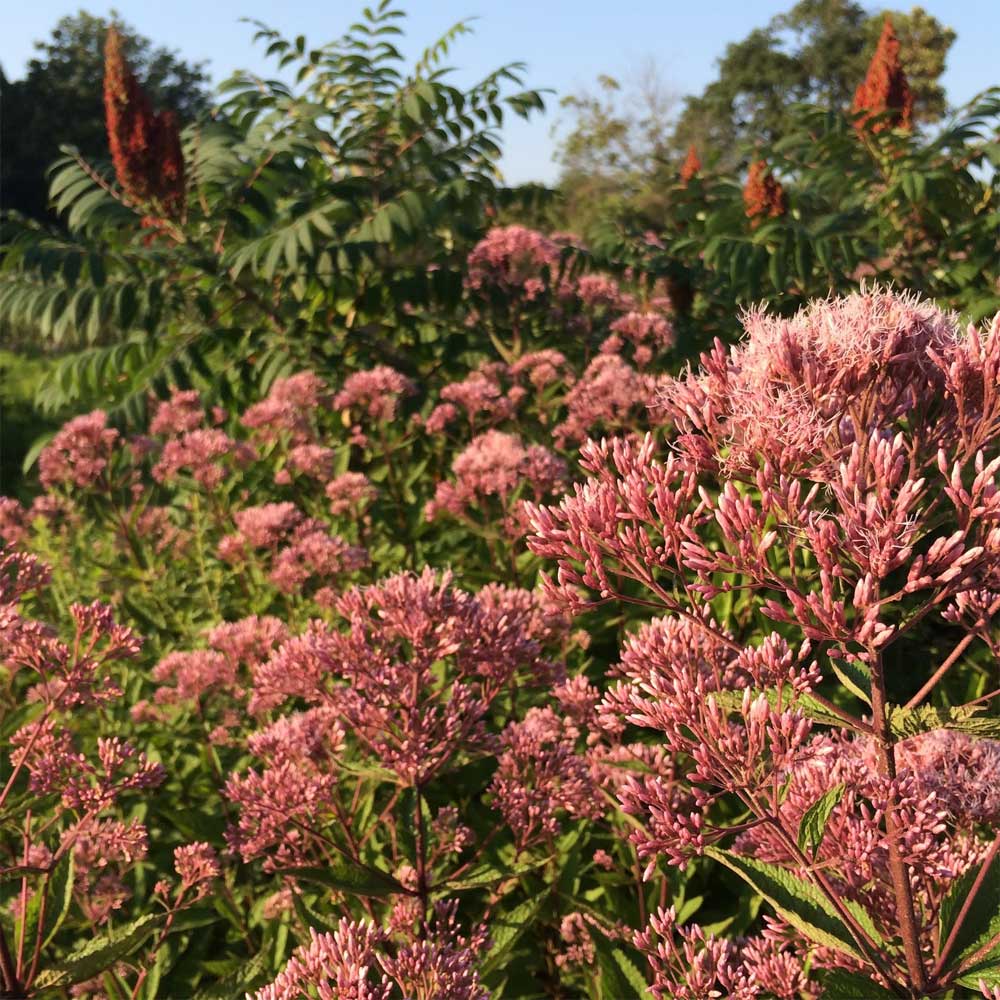 Invasive Plant Management: Late Season Strategies and Methods for Restoring Habitat
Invasive Plant Management: Late Season Strategies and Methods for Restoring Habitat
August 31st, 9-12 pm
Canonchet Farm, Narragansett
Join Thomas Fortier, for session 2 of a guided field study at Canonchet Farm Habitat Restoration. While participants are not required to attend both sessions, the effective strategies for invasive plant removal and habitat restoration in the late season vary significantly from those used in the early season. We’ll look at the methods for restoring the native plant complexes and delve into plant identification. Each participant will have the chance to try out a range of tools for invasive removal. Dress for field work. Space is limited.
Please register in Volgistics.
Hot Topics from the URI Consumer Horticulture Educator
 The following science-based articles may help you answer questions from the community. Rosanne Sherry, URI Consumer Horticulture Educator, recommends you read them to help sharpen your own gardening and educator skills! Please send comments or suggestions for articles to rsherry@uri.edu.
The following science-based articles may help you answer questions from the community. Rosanne Sherry, URI Consumer Horticulture Educator, recommends you read them to help sharpen your own gardening and educator skills! Please send comments or suggestions for articles to rsherry@uri.edu.
From Eco-RI June 20, 2017
Aquidneck Island Embraces Green Infrastructure to Battle Polluted Stormwater Runoff
Bradford Dam’s Removal will Help Fish Migrate, Improve Paddling and Reduce Flooding
The Surprising Number of American Adults Who Think Chocolate Milk Comes from Brown Cows – (Washington Post – June 15, 2017)
Seven percent of all American adults believe that chocolate milk comes from brown cows, according to a nationally representative online survey commissioned by the Innovation Center of U.S. Dairy. If you do the math, that works out to 16.4 million misinformed, milk-drinking people. The equivalent of the population of Pennsylvania (and then some!) does not know that chocolate milk is milk, cocoa and sugar. But the most surprising thing about this figure may actually be that it isn’t higher. For decades, observers in agriculture, nutrition and education have griped that many Americans are basically agriculturally illiterate. One Department of Agriculture study, commissioned in the early ’90s, found that nearly 1 in 5 adults did not know that hamburgers are made from beef. Many more lacked familiarity with basic farming facts, like how big U.S. farms typically are and what food animals eat. Studies have shown that people who live in agricultural communities tend to know a bit more about where their food comes from, as do people with higher education levels and household incomes. But in some populations, confusion about basic food facts can skew pretty high. When one team of researchers interviewed fourth-, fifth- and sixth-graders at an urban California school, they found that more than half of them didn’t know pickles were cucumbers, or that onions and lettuce were plants.
From Green Talks June 28, 2017
New Certification for Bee Friendly Farms
Farmers now have the option of enrolling in the Bee Better Certified program, which certifies growing operations and lets consumers know they are farming in ways that benefit bees. The program is a partnership of the Xerces Society for Invertebrate Conservation and Oregon Tilth, and it’s funded by a grant from the U.S. Department of Agriculture (USDA).
The program was initially piloted with 13 farmers, and it’s now open for enrollment nationwide. The program focuses on integrating flower-rich habitats to create food and nesting sites for native bees, honey bees and other pollinators. It also helps farmers reduce or eliminate the use of pesticides known to cause harm to bees.
One interesting note: the program requires that if you use commercial bumble bees for pollination services, you need to use them in the greenhouse and use screens to ensure they don’t leave the greenhouse.
Oregon Tilth receives applications from interested farmers, inspects the farm and will then certify it if the standards are met. Those who gain certification may use the Better Bee seal on their products (and manufacturers may also use the seal if the product contains certified ingredients). Learn more at: http://www.beebettercertified.org/.
 Home
Home Browse
Browse Close
Close Events
Events Maps
Maps Email
Email Brightspace
Brightspace eCampus
eCampus


